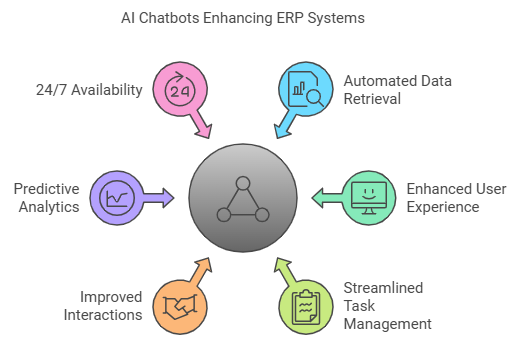Boost Your ERP Strategy with These 10 AI Chatbots in 2025
The integration of AI chatbots within Enterprise Resource Planning (ERP) systems is revolutionizing how businesses streamline workflows, manage customer interactions, and automate critical processes. With the power of AI, chatbots in ERP systems can efficiently handle complex queries, provide real-time support, and optimize operational tasks, making them indispensable for modern business environments. The versatility of AI voice bots, in particular, allows ERP systems to enhance the user experience by enabling hands-free, intuitive interactions that improve both employee and customer satisfaction.
 Top 10 AI Chatbots for ERP
Top 10 AI Chatbots for ERPIn 2025, AI chatbots for ERP are set to make a transformative impact on how businesses operate, facilitating everything from inventory management and financial analysis to HR support and customer service. These chatbots not only support automation but also provide intelligent insights, helping businesses predict trends, identify opportunities, and proactively address challenges. This blog explores the top AI chatbots for ERP in 2025, focusing on their capabilities, integration advantages, and how they drive efficiency and innovation in ERP landscapes.
Table of Content
What Is an ERP AI Chatbot?The Role of AI Chatbots in ERP Systems
Top 10 AI Chatbots for ERP in 2025
· SAP Conversational AI
· Microsoft Power Virtual Agents
· Oracle Digital Assistant
· Zoho SalesIQ Chatbot
· ServiceNow Virtual Agent
· Infor Coleman AI
· Freshdesk Freddy AI
· Kore.ai for ERP
· ChatGPT API for ERP
· UiPath Chatbot with ERP Automation
Choosing the Right ERP AI Chatbot for Your Business
Benefits of Using AI Chatbots in ERP Systems
Conclusion
FAQs
What Is an ERP AI Chatbot?
An ERP AI chatbot is an artificial intelligence-driven tool embedded within an Enterprise Resource Planning (ERP) system to enhance business operations and communication. These chatbots interact with users to automate processes, answer queries, and provide real-time support across various ERP functions, such as inventory management, financial tracking, and customer relationship management. By leveraging AI algorithms, these chatbots can understand natural language, interpret complex commands, and perform tasks autonomously, improving operational efficiency and decision-making. The continued focus on AI chatbot development enables businesses to integrate more sophisticated and intuitive solutions into their ERP systems, ultimately streamlining workflows and boosting productivity.
The Role of AI Chatbots in ERP Systems
AI chatbots are increasingly integral to Enterprise Resource Planning (ERP) systems, transforming how organizations interact with complex data and improving operational efficiency.
 AI Chatbots in ERP
AI Chatbots in ERP1. Automated Data Retrieval and Analysis
AI chatbots in ERP systems provide quick access to data across various modules, such as finance, HR, inventory, and supply chain. By asking the chatbot specific questions, users can retrieve reports, analytics, and data insights in real-time without manually navigating multiple ERP modules. This functionality is especially valuable for employees who need quick, data-driven answers but may lack extensive ERP expertise.
2. Enhanced User Experience
Many ERP systems can be complex to navigate, particularly for users without technical backgrounds. AI chatbots simplify this by offering a conversational interface, enabling users to perform tasks like checking order status, updating records, or running reports through simple queries. By removing friction in the user experience, AI voice bots and chatbots encourage wider and more effective adoption of ERP functionalities across all departments.
3. Streamlined Task Management
AI chatbots help users manage and prioritize tasks more effectively. For instance, a chatbot can notify employees of pending tasks, upcoming deadlines, or new approvals awaiting their review. Chatbot Development for ERP systems also incorporates workflow automation, enabling bots to handle routine tasks such as approving purchase orders or updating inventory records, freeing up employees for more strategic activities.
4. Improved Customer and Vendor Interactions
With customer service capabilities, AI chatbots embedded in ERP systems can serve as an interface for customer and vendor inquiries. Whether a customer is checking on the status of an order or a vendor is verifying payment details, the chatbot can handle these requests autonomously. This speeds up response times and ensures that customer and vendor needs are met promptly and efficiently.
5. Predictive Analytics and Decision Support
AI-powered ERP chatbots can provide valuable insights based on predictive analytics, assisting managers in making informed decisions. By analyzing historical data and identifying trends, chatbots can offer recommendations on inventory management, workforce planning, and demand forecasting. This added layer of intelligence helps businesses proactively manage resources and optimize workflows.
6. 24/7 Availability and Consistency
AI chatbots are available round-the-clock, ensuring that ERP-related support is accessible at any time, regardless of business hours. This consistent availability is crucial in global organizations where teams may work across different time zones, allowing uninterrupted support and seamless data accessibility.
Top 10 Best AI Chatbots for ERP in 2025
The top 10 AI chatbots transforming ERP systems in 2025, boosting efficiency, automation, and decision-making across industries.
SAP Conversational AI
SAP Conversational AI is a sophisticated chatbot platform designed to seamlessly integrate with SAP ERP, S/4HANA, and other SAP solutions. This AI-powered assistant enhances enterprise operations by enabling businesses to automate routine tasks, improve efficiency, and optimize workflows within the SAP ecosystem.
Key Features:
- Multi-language support: The platform supports multiple languages, making it suitable for global businesses.
- Natural Language Understanding (NLU): The chatbot understands and processes human language, allowing it to interact intuitively with users.
- Seamless SAP Integration: SAP Conversational AI easily connects with SAP applications, enabling it to pull relevant data and execute tasks without disruption.
- User-friendly analytics: It offers valuable insights into user interactions, providing businesses with data that can improve decision-making.
Benefits:
- Optimizes employee experience: Employees can interact with the chatbot for quick, automated responses to their queries, reducing manual work and response times.
- Streamlines workflows: By automating repetitive tasks such as data entry and reporting, allows employees to focus on higher-value activities.
- Enhances customer support: The chatbot can handle customer inquiries efficiently, ensuring a faster response time and better overall customer experience.
Microsoft Power Virtual Agents
Microsoft Power Virtual Agents is an AI-powered chatbot designed to help businesses automate and streamline processes across their operations. Part of the Microsoft Power Platform, it integrates seamlessly with Microsoft Dynamics 365 ERP, enhancing the functionality of various ERP modules and ensuring a smooth flow of data and insights.
Key Features:
- Drag-and-drop design: The platform offers an intuitive, no-code interface that allows users to create and deploy chatbots without technical expertise.
- Advanced analytics: Power Virtual Agents provides actionable insights into chatbot performance, helping businesses track user interactions and optimize responses.
- Integration with Office 365 and Dynamics 365: The chatbot integrates well with Office 365 and Dynamics 365, facilitating a unified approach to business operations.
- AI-driven insights: It utilizes AI to analyze trends, detect patterns, and provide relevant recommendations, improving decision-making and service quality.
Benefits:
- Automates responses across multiple ERP modules: By leveraging its integration with Microsoft Dynamics 365, the chatbot can efficiently manage queries related to finance, HR, and supply chain modules, reducing manual intervention.
- Enhances productivity: The automation of repetitive tasks frees up employees to focus on higher-value activities.
- Improves customer experience: The chatbot’s ability to provide real-time, accurate responses enhances customer satisfaction, ensuring quicker resolutions to inquiries.
Oracle Digital Assistant
Oracle Digital Assistant is an AI-powered chatbot designed to optimize and automate key business functions within Oracle ERP Cloud. By leveraging deep integration with Oracle’s suite of applications, this digital assistant enables businesses to improve operational efficiency, streamline workflows, and enhance user experience across various departments.
Key Features:
- Deep integration with Oracle applications: The assistant integrates seamlessly with Oracle ERP Cloud, allowing it to access and process real-time data, enabling smooth interactions within the system.
- Voice and text-based conversational abilities: Oracle Digital Assistant supports both voice and text interactions, offering flexibility for users to communicate in the most convenient way.
- Self-learning AI: The platform utilizes self-learning AI that improves over time, adapting to user preferences and becoming more efficient in delivering responses and automating tasks.
Benefits:
- Enhances employee engagement: By providing a user-friendly interface, the assistant improves employee interactions with the Oracle ERP system, making it easier to access data and complete tasks.
- Automates tasks: The assistant automates routine processes such as data entry, reporting, and inquiry handling, allowing employees to focus on higher-value work.
- Reduces operational inefficiencies: With real-time processing and intelligent automation, the Oracle Digital Assistant helps reduce delays and errors, leading to more efficient operations across Oracle-based ERP systems.
Zoho SalesIQ Chatbot
Zoho SalesIQ Chatbot is an AI-powered conversational assistant designed to integrate seamlessly with Zoho’s ERP and CRM platforms. This chatbot aims to enhance customer interactions, streamline sales processes, and provide valuable insights, making it particularly beneficial for small to medium-sized enterprises (SMEs).
Key Features:
- Customization options: The chatbot can be tailored to suit specific business needs, including custom workflows, conversation styles, and integrations.
- Multi-channel support: Zoho SalesIQ can interact with customers across various communication channels such as websites, mobile apps, and social media platforms, ensuring a consistent experience.
- Smart targeting based on visitor behavior: The chatbot uses visitor data and behavior to personalize interactions, offering targeted responses and guiding users based on their interests and actions.
Benefits:
- Improves customer service: The chatbot provides immediate responses to customer inquiries, helping to resolve issues and answer questions in real-time.
- Assists with sales tracking: Zoho SalesIQ tracks sales leads, monitors user engagement, and provides analytics to help businesses identify potential opportunities.
- Automates follow-up tasks: By automating follow-ups and routine sales tasks, the chatbot frees up time for sales teams, allowing them to focus on higher-value activities. These features make it an ideal solution for SMEs looking to optimize their customer service and sales operations.
ServiceNow Virtual Agent
ServiceNow Virtual Agent is an AI-powered chatbot designed to automate workflows and simplify business processes, particularly within HR and IT departments. Integrated with ServiceNow’s broader platform, this chatbot enhances service delivery, reduces repetitive tasks, and improves overall operational efficiency across various enterprise functions.
Key Features:
- No-code setup: ServiceNow Virtual Agent allows users to create and configure chatbots without needing coding expertise, enabling quick deployment and easy customization.
- Cross-department integrations: The chatbot integrates with various departments, including HR, IT, and customer service, ensuring seamless interaction across different business units and systems.
- Machine learning for issue resolution: Utilizing machine learning, the chatbot can resolve common issues, escalate complex problems to the right teams, and continuously improve its ability to handle queries efficiently.
Benefits:
- Reduces service request volumes: By automating routine tasks and providing quick resolutions to common queries, the chatbot decreases the workload on service teams, allowing them to focus on more complex issues.
- Improves user satisfaction: Faster response times and 24/7 availability help enhance the user experience, providing immediate support for employees and customers alike.
- Quick access to ERP data and tasks: The Virtual Agent can retrieve and process ERP data quickly, ensuring users can perform tasks like managing HR requests or IT support issues without delays, leading to improved productivity.
Infor Coleman AI
Infor Coleman AI is an advanced AI platform designed to integrate seamlessly with Infor’s ERP systems, enhancing business operations with intelligent insights and automation. Coleman AI leverages Infor’s industry-specific ERP solutions to provide actionable data and streamline processes across various business functions, particularly in supply chain and human resources.
Key Features:
- Natural Language Processing (NLP): Coleman AI utilizes NLP to interact with users in a conversational way, enabling intuitive communication with ERP systems and simplifying data queries.
- Industry-specific ERP optimization: Designed for various industries, such as manufacturing, healthcare, and retail, Coleman AI tailors its features to optimize ERP systems for specific sector needs, improving efficiency and relevance.
- Predictive insights: The AI platform uses machine learning and predictive analytics to provide actionable insights, helping businesses forecast trends and make more informed decisions.
Benefits:
- Automates supply chain and HR functions: By automating routine tasks such as order processing, inventory management, and HR workflows, Coleman AI frees up valuable resources for more strategic activities.
- Enhances customer interactions: The AI-driven insights improve customer service by streamlining communication and providing personalized responses.
- Data-driven decision-making support: With predictive insights and real-time analytics, Coleman AI empowers businesses to make informed, data-driven decisions, improving overall operational performance.
Freshdesk Freddy AI
Freshdesk Freddy AI is an advanced AI-powered chatbot designed to integrate seamlessly with Freshdesk and Freshservice, enhancing customer and employee support in ERP-related tasks. By leveraging artificial intelligence, Freddy AI streamlines ticket management, automates routine inquiries, and delivers contextual information from Freshworks ERP and CRM systems, improving overall service efficiency.
Key Features:
- Self-learning capabilities: Freddy AI continuously learns from user interactions and improves over time, providing more accurate responses and adapting to new trends.
- User-friendly interface: The platform offers an intuitive interface, enabling easy setup and management for businesses, without the need for technical expertise.
- Deep integration with Freshworks ERP and CRM: Freddy AI seamlessly integrates with Freshworks’ ERP and CRM systems, accessing critical data and providing real-time insights for customer and employee support.
Benefits:
- Speeds up ticket resolution: Freddy AI can automatically categorize and prioritize tickets, enabling faster resolutions and reducing wait times for customers.
- Automates customer inquiries: The chatbot handles common customer queries, allowing support teams to focus on more complex issues.
- Provides contextual ERP information: By accessing ERP data, Freddy AI offers accurate, relevant information to customers and employees, improving service quality and decision-making. This makes it an ideal solution for businesses seeking to enhance support functions and optimize workflows.
Kore.ai for ERP
Kore.ai is a robust AI-powered chatbot platform designed to integrate with various ERP systems, offering businesses a versatile solution to automate tasks and enhance operational efficiency. By seamlessly connecting with multiple ERP platforms, Kore.ai improves workflows, boosts productivity, and provides intelligent insights across departments such as finance, HR, and supply chain management.
Key Features:
- Omni-channel support: Kore.ai ensures a consistent user experience across various communication channels, including web, mobile, and messaging platforms, allowing businesses to engage with users wherever they are.
- Natural Language Processing (NLP) engine: The advanced NLP engine enables the chatbot to understand and respond to user queries in natural language, making interactions intuitive and human-like.
- Customizable workflows: Businesses can easily tailor workflows to suit their specific needs, automating routine tasks like data entry, report generation, and issue resolution.
- Intelligent analytics: Kore.ai provides actionable insights through analytics, helping businesses monitor chatbot performance, identify trends, and optimize processes.
Benefits:
- Automates queries: Kore.ai handles routine inquiries, reducing the load on support teams and allowing them to focus on more complex tasks.
- Provides real-time ERP updates: The chatbot can retrieve and deliver up-to-date ERP data, ensuring users have access to the latest information.
- Efficient task management: With automation and customized workflows, Kore.ai enables smooth task management across different departments, improving overall business efficiency and productivity.
ChatGPT API for ERP
OpenAI’s ChatGPT API is a powerful conversational AI tool that can be seamlessly integrated into ERP systems, providing businesses with highly flexible and scalable solutions. By leveraging advanced natural language processing (NLP), this API enhances ERP interactions, automating tasks and streamlining communication across various business functions, such as finance, supply chain, and human resources.
Key Features:
- Advanced NLP: ChatGPT’s sophisticated NLP engine understands and processes complex language, allowing it to handle intricate queries and provide meaningful responses in real-time.
- High customization: The API can be tailored to meet specific business needs, ensuring that the chatbot aligns with company processes, terminology, and user preferences.
- API integrations with major ERP systems: ChatGPT API integrates smoothly with leading ERP platforms like SAP, Oracle, and Microsoft Dynamics, enabling it to pull relevant data, manage workflows, and provide actionable insights within the ERP environment.
Benefits:
- Highly tailored chatbot solutions: The API’s flexibility allows businesses to design a chatbot that fits seamlessly into their ERP environment and meets specific functional requirements.
- Excellent at handling complex questions: ChatGPT is adept at answering detailed and complex ERP-related queries, enhancing support and decision-making processes.
- Scalable for different ERP environments: Whether deployed in small-scale operations or large enterprises, ChatGPT API is highly scalable, ensuring that it grows with the needs of the business and adapts to evolving ERP systems.
UiPath Chatbot with ERP Automation
UiPath’s AI chatbot, integrated with its Robotic Process Automation (RPA) platform, offers a powerful solution to automate tasks within ERP systems. By combining advanced chatbot capabilities with RPA technology, UiPath enables businesses to streamline workflows, reduce manual effort, and enhance productivity across various ERP modules such as finance, HR, and supply chain management.
Key Features:
- Advanced RPA and chatbot integration: UiPath’s chatbot works in tandem with RPA, automating both simple and complex tasks within ERP systems. This integration allows for more efficient process execution and faster response times.
- Task automation: The chatbot automates repetitive and mundane tasks such as data entry, retrieval, and report generation, freeing up valuable employee time for more strategic activities.
- Cross-platform ERP support: UiPath’s chatbot integrates seamlessly with multiple ERP platforms, including SAP, Oracle, and Microsoft Dynamics, ensuring versatility and scalability for businesses with diverse ERP environments.
Benefits:
- Ideal for repetitive ERP tasks: Automating routine tasks within ERP systems helps reduce errors, speed up processes, and minimize the risk of human oversight.
- Improves operational efficiency: By integrating automation across ERP workflows, UiPath’s solution accelerates task completion, leading to improved overall efficiency.
- Automates data entry and retrieval: The chatbot can quickly extract and input data into ERP systems, ensuring up-to-date information and reducing the need for manual intervention.
Choosing the Right ERP AI Chatbot for Your Business
Choosing the right ERP AI chatbot for your business is a critical decision that can significantly enhance your ERP system’s effectiveness, streamline operations, and improve user experience.
1. Integration Capabilities
One of the most important factors to consider is how well the AI chatbot integrates with your existing ERP system. Whether you are using SAP, Oracle, Microsoft Dynamics, or any other ERP software, the chatbot must seamlessly interface with your system’s modules.
2. Natural Language Processing (NLP) Capabilities
The effectiveness of an AI chatbot largely depends on its ability to understand and respond to user inputs in natural language. Look for chatbots with advanced Natural Language Processing (NLP) capabilities that can interpret complex queries, handle various phrasing styles, and provide accurate answers or take relevant actions.
3. Customization and Flexibility
Your business has unique needs, and the chatbot should be flexible enough to adapt to your processes and workflows. It should allow for customization to suit your specific industry, business size, and goals. Whether it’s adjusting the chatbot’s responses, setting up specific workflows, or integrating with other business tools, customization can ensure that the AI chatbot meets your requirements.
4. User Experience (UX) and Interface Design
A good AI chatbot should have a user-friendly interface. It should be easy to navigate and provide quick, accurate responses. The user experience is crucial for ensuring employees adopt the chatbot and use it regularly. The design should also accommodate employees with different levels of technical expertise, making the interface intuitive and approachable.
5. Security and Compliance
Since ERP systems handle sensitive business data such as financial records, employee information, and customer details, security and compliance are essential. Ensure that the AI chatbot follows industry best practices for data security, including encryption, secure data storage, and regular security audits. Additionally, the chatbot should be compliant with relevant regulations, such as GDPR or CCPA, especially if your business operates internationally.
6. Support and Maintenance
Before committing to a specific AI chatbot, assess the level of support and maintenance the vendor provides. Ideally, you want a solution with robust customer service and a support team that can assist with troubleshooting, updates, and ongoing improvements. A chatbot that requires minimal maintenance is also beneficial to ensure continuous, uninterrupted operations.
7. Cost and ROI
Cost is always a consideration, but it’s important to focus on the return on investment (ROI) that an AI chatbot can bring. While the initial cost may be high, the benefits — such as improved efficiency, enhanced productivity, and cost savings from automating repetitive tasks — can significantly outweigh the investment. Make sure to evaluate the total cost of ownership, including licensing, setup, training, and ongoing maintenance.
8. Analytics and Reporting
A good AI chatbot should provide analytics and reporting capabilities that allow you to measure its effectiveness and track key performance indicators (KPIs). These insights can help you optimize chatbot performance and gain a deeper understanding of user behavior, common queries, and areas for improvement.
Benefits of Using AI Chatbots in ERP Systems
Integrating AI chatbots into ERP systems provides numerous benefits that can enhance operational efficiency, improve user experiences, and streamline business processes.
 AI Chatbots in ERP Systems
AI Chatbots in ERP Systems1. Improved Efficiency and Time Savings
AI chatbots automate repetitive tasks such as data entry, report generation, and order tracking. By eliminating the need for manual input, chatbots free up time for employees to focus on more strategic tasks. For example, when an employee needs to check inventory levels or confirm order statuses, a chatbot can instantly provide the information, saving time and boosting overall productivity.
2. Real-Time Access to Information
One of the standout advantages of AI chatbots is their ability to provide real-time data. Users can access crucial ERP information, such as financial reports, stock levels, and customer orders, simply by asking the chatbot. This instant access to real-time insights enables faster decision-making, helping businesses respond promptly to market changes or operational needs.
3. Enhanced User Experience
ERP systems can be complex and challenging for many users to navigate. AI chatbots provide an intuitive interface that simplifies user interactions. By enabling natural language communication, employees can easily access data or perform tasks without needing to master the ERP software. This ease of use promotes faster adoption and reduces training time for new users.
4. 24/7 Availability and Support
AI chatbots offer 24/7 availability, ensuring employees and users always have access to the information they need, no matter the time zone or business hours. This constant availability reduces reliance on IT or ERP specialists for routine queries and ensures that business operations continue smoothly, especially for global organizations operating across multiple regions.
5. Cost Savings
Automating routine tasks with AI chatbots helps reduce operational costs. By minimizing the need for human involvement in repetitive functions, businesses can allocate resources more effectively, enabling employees to focus on high-impact activities. Additionally, chatbots reduce the need for extensive training or dedicated support staff, further cutting costs.
6. Consistency and Accuracy
AI chatbots ensure consistency by following predefined workflows and processes. Since they operate without human error, tasks such as data entry, order processing, and reporting are performed accurately every time. This consistency helps maintain high-quality standards and reduces the likelihood of mistakes that could lead to costly errors or delays.
Conclusion
In 2025, AI chatbots are proving to be a game-changer for ERP systems, driving enhanced efficiency, seamless customer interactions, and advanced automation across various business functions. By integrating AI chatbots, businesses can streamline operations, improve decision-making, and deliver a more personalized and responsive experience to both employees and customers. The role of AI chatbots in ERP is increasingly crucial for optimizing workflow, elevating customer satisfaction, and ensuring overall system performance. As companies continue to embrace digital transformation, exploring AI chatbots development options that align with their business goals and ERP needs will be essential for staying competitive in the evolving market landscape.
FAQs
1. What is an ERP AI chatbot and how does it work?
An ERP AI chatbot is an automated tool designed to integrate with Enterprise Resource Planning (ERP) systems, enabling businesses to streamline workflows, handle inquiries, and automate repetitive tasks. It uses artificial intelligence and natural language processing (NLP) to interact with users and provide real-time responses and data insights.
2. What are the benefits of using AI chatbots in ERP systems?
AI chatbots can significantly enhance productivity by automating administrative tasks, improving data retrieval, offering 24/7 customer support, and streamlining internal communication. They help reduce human error, cut operational costs, and improve user satisfaction by providing instant responses to queries.
3. Which ERP systems are best suited for AI chatbot integration?
Leading ERP systems like SAP, Microsoft Dynamics 365, Oracle ERP Cloud, and Infor are well-suited for AI chatbot integration. These systems allow seamless connections with AI chatbots, enhancing automation, data analysis, and user engagement.
4. Can AI chatbots improve ERP system efficiency?
Yes, AI chatbots can automate repetitive tasks, such as invoice processing, customer queries, inventory management, and HR operations. This reduces manual effort, speeds up decision-making, and increases overall efficiency within the ERP system.
5. What is the future of AI chatbots in ERP systems by 2025?
By 2025, AI chatbots in ERP systems are expected to become more intelligent, intuitive, and integrated across multiple platforms. Advances in machine learning, NLP, and predictive analytics will allow chatbots to offer even more personalized, data-driven insights, improving decision-making and providing deeper integration with all business functions.
Top 10 Best AI Chatbots for ERP in 2025 was originally published in The Capital on Medium, where people are continuing the conversation by highlighting and responding to this story.

 3 months ago
43
3 months ago
43









 English (US) ·
English (US) ·